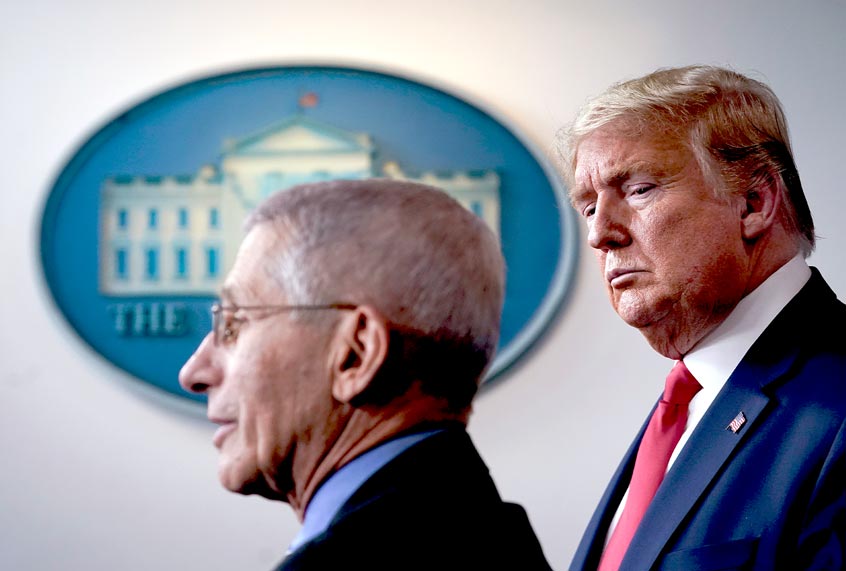Dr. Anthony Fauci, the top infectious disease expert in the country, warned Tuesday that the U.S. could hit 100,000 new coronavirus cases per day on its current trajectory.
After weeks of decline, the country hit a record-high in newly reported cases last week. Despite the Trump administration’s insistence that the situation is under control, Fauci gave senators a “very disturbing” prediction.
“We are now having 40,000-plus new cases a day,” Fauci told the Senate Education, Labor and Pensions Committee. “I would not be surprised if we go up to 100,000 a day if this does not turn around and — so I’m very concerned.”
With new cases nearly doubling since mid-May, White House press secretary Kayleigh McEnany claimed Monday that there were only some “embers that need to be put out.”
Fauci rejected that narrative one day later, warning that outbreaks in certain areas put the entire country at risk. States like Florida and Texas, which were among the last states to shutdown and the first states to reopen, risk progress made by states like New York and New Jersey, he said.
“I will guarantee you that, because when you have an outbreak in one part of the country — even though in other parts of the country they’re doing well — they are vulnerable,” he said. “I made that point very clearly last week at a press conference. We can’t just focus on those areas that are having the surge. It puts the entire country at risk.”
Fauci’s comments came in response to Sen. Elizabeth Warren, D-Mass., who asked how many more infections and infections Americans would see.
“Well, I think the numbers speak for themselves,” Fauci said. “I’m very concerned, and I’m not satisfied with what’s going on because we’re going in the wrong direction, if you look at the curves of the new cases. So we really have got to do something about that, and we need to do it quickly.”
Dr. Fauci to @SenWarren: "We are now having 40,000+ new cases a day. I would not be surprised if we go up to 100,000 a day if this does not turn this around. So, I am very concerned."
Full video here: https://t.co/9CWzMyhLWV pic.twitter.com/ttbtxeeMX4
— CSPAN (@cspan) June 30, 2020
Fauci suggested that the outbreaks may be the result of states reopening too early or disregarding health guidelines.
“We’ve got to make sure that when states start to try to open again, they need to follow the guidelines that have been very carefully laid out with regard to checkpoints,” Fauci said, adding that some states were “going too quickly” and “skipping over some of the checkpoints.”
Fauci: "I am also quite concerned about what we are seeing evolve right now in several states … they need to follow the guidelines that have been very carefully laid out with regard to [reopening] checkpoints … in some, they're going too quickly & skipping over some." pic.twitter.com/C4iwL4mFtW
— Aaron Rupar (@atrupar) June 30, 2020
Fauci also expressed concerns that some people disregard federal health guidelines on masks and social distancing.
“I think the attitude of pushing back from authority and pushing back on scientific data is very concerning,” he said. “We’re in the middle of catastrophic outbreak, and we really do need to be guided by scientific principles.”
Dr. Robert Redfield, the head of the Centers for Disease Control and Prevention, echoed Fauci’s comments on masks.
“It is critical that we all take the personal responsibility to slow the transmission of COVID-19 and embrace the universal use of face coverings,” he told the committee.
Sen. Lamar Alexander, R-Tenn., the chairman of the committee, said at the hearing that he personally urged President Donald Trump to wear a mask.
“I have suggested the president should occasionally wear a mask, even though there are not many occasions when it is necessary for him to do so,” he said. “The president has millions of admirers. They would follow his lead.”
"Unfortunately, this simple, life-saving practice has become part of the political debate."
In Senate hearing, Sen. Lamar Alexander and health officials, including Dr. Anthony Fauci, stress importance of face masks in preventing the spread of COVID-19. https://t.co/8UYo6kdkT0 pic.twitter.com/i7DNWp1T36
— ABC News (@ABC) June 30, 2020
Trump has refused to wear a mask in public and championed Florida and Texas’ plans to reopen. The president even suggested in a recent Wall Street Journal interview that some people wear masks “as a way to signal disapproval of him.” He mocked a reporter for wearing a mask during a news conference last month.
Trump’s opposition to masks is ironic given his obsession with how the pandemic has impacted the economy. Trump spent crucial weeks early on downplaying the threat posed by the virus in an effort to boost the stock market. A report by Goldman Sachs economists this week predicted that a national mask requirement “could potentially substitute for lockdowns that would otherwise subtract” nearly 5% of the country’s GDP.
House Minority Leader Kevin McCarthy, R-Calif., on Tuesday urged Trump to wear a mask.
“I mean, for the Fourth of July, we could all show our patriotism with a red, white and blue mask, going out there and showing some strength,” he said in an appearance on “Fox & Friends.”
Fox News host Steve Doocy, whom Trump has reportedly ranked as a 12 on a loyalty scale of 1-10, also encouraged the president to start wearing a mask in public.
“I think that if the president wore one, it would just set a good example. He’d be a good role model. I don’t see any downside to the president wearing a mask in public,” Doocy told Republican National Committee Chairwoman Ronna McDaniel. “‘MAGA’ should now stand for ‘Masks Are Great Again.’ Let me give you some marketing advice right there.”
Fox and Friends co-host Steve Doocy: "MAGA should now stand for 'Masks Are Great Again.'" pic.twitter.com/phM1pke5Hp
— TPM Livewire (@TPMLiveWire) June 30, 2020

